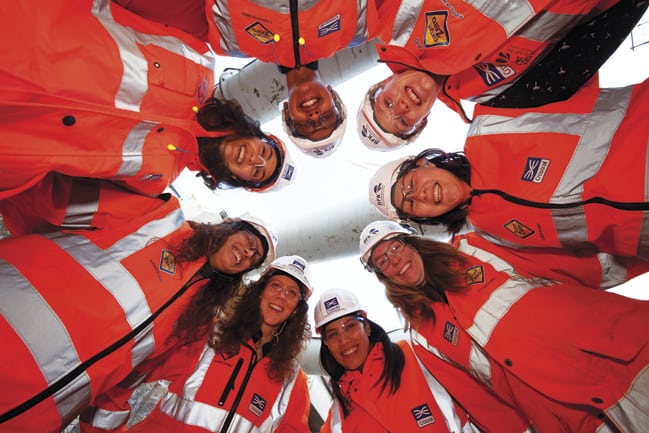 Jason Ford, news editor
Jason Ford, news editor
Tomorrow marks the start of Britain’s largest construction trade show and with it comes a timely discussion about skills in an era of nation defining infrastructure projects.
As part of UK Construction Week the Institute of Environmental Management and Assessment (IEMA) will host a Skills & Sustainable Infrastructure Conference, which concludes with a session titled ‘Growing the skills base from education to legacy’, which will be delivered by Selvin Roberts, EDF Energy, and Simon Bennett, head of Learning Legacy, Crossrail.
Their session coincides with a report from Balfour Beatty about attracting women into the construction industry, and a speech by the head of Network Rail about the value of a diverse workforce.
Describing research undertaken for Network Rail, chief executive Mark Carne made it clear that a diverse workforce will have a positive impact on business improvement, noting that Network Rail teams with over 20 per cent women were more engaged, safer, collaborative and more motivated.
Consequently, said Carne, 20 per cent is a critical minimum threshold for positive gender impact "and the closer teams get to an even gender balance, the better they get."
"So we have set ourselves an initial challenge that all our business units need to have clear action plans to help them achieve the 20 per cent threshold," he said at Network Rail’s ‘Everyone Summit’. "And for those achieving 20 per cent already, we want them to set ambitious plans to improve further still."
To achieve this, Carne said attraction, recruitment, retention and progression are the four key steps in achieving this goal.
He noted also that 40,000 people work with him at Network Rail, with 16 per cent of roles taken by women. On the operations side, that figure drops to 10 per cent.
"Just 280 of our 3100 engineers are women," he said. "It is shocking isn’t it?"

Carne’s sentiments are echoed in a report from Balfour Beatty which looks primarily at redressing the gender imbalance of its workforce.
In ‘Inspiring change – Attracting women into construction’, Leo Quinn, group chief executive, notes that just 13 per cent of the construction sector’s workforce are female and that Balfour Beatty is striving for a new ‘business as usual’ that will include a workforce that better reflects the communities in which it works.
As the paper points out, projects including HS2, Hinkley Point C and – potentially – expansion at Heathrow will require a significant number of skilled professionals to bring them to life and maintain them, which equates to another million workers into the industry by 2020.
The report states: "With the uncertainty surrounding Brexit and the workers from the EU that the industry has become reliant on, this is likely to be challenging. And yet, women are expected to make up only a quarter of the industry’s workforce by 2020."
To overcome the challenges it faces, the paper makes 10 recommendations that include: raising the profile of existing female employees to help encourage others into the profession; engaging primary school-aged children in STEM subjects; addressing pay disparity with results based remuneration; establish a single, universal admissions service for people applying for T-levels, A-levels, Further Education colleges, Higher Education institutes and apprenticeships; and for industry itself to take a harder stance on sexism, discrimination and bullying.

As part of efforts to encourage the uptake of women in engineering, the new National College for High Speed Rail in Doncaster and Birmingham hosted an engineering challenges session as part of this year’s Women in Engineering Day. July’s event challenged school girls to produce a new smart and high-tech, high-visual vest, designed to test their problem-solving and creative design abilities during interactive workshops, led by female engineering ambassadors.
The Doncaster and Birmingham colleges are actively encouraging applications from a range of backgrounds to embark on higher apprenticeships, HNC (Higher National Certificate) and CPD (Continued Professional Development) courses.
Speaking in July, Clair Mowbray, chief executive of the National College for High Speed Rail, said: “As an employer-led college - we are working with industry to help play a major role in helping reduce the UK skills gap in engineering and produce a new generation of engineers equipped with the skills that businesses need.
“This means looking at issues across the sector and one of the fundamental challenges we have, is encouraging more females to consider a career in the industry. Our message is clear – we have a cutting-edge new training facility to create the future generation of rail workers.
“We want more females involved to plug the existing skills gap and to forge a career for themselves in this highly exciting and growing new sector.”
UK Construction Week takes place at the Birmingham NEC from 10 – 12 October 2017





Project to investigate hybrid approach to titanium manufacturing
What is this a hybrid of? Superplastic forming tends to be performed slowly as otherwise the behaviour is the hot creep that typifies hot...